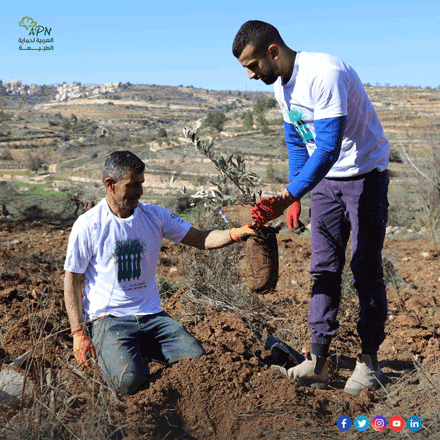You are here
Environmentalist group launches #TreesforPalestine awareness campaign
By Mays Ibrahim Mustafa - Mar 13,2023 - Last updated at Mar 14,2023

The Arab Group for the Protection of Nature’s Million Tree Campaign, launched in 2001 during the second Palestinian Intifada (uprising), aims to replant trees destroyed by Israeli forces (Photo courtesy of APN)
AMMAN — Since 2000, Israel has “uprooted, poisoned, burnt and bombed” over three million fruit trees in Palestine, according to the Arab Group for the Protection of Nature (APN), which launched an awareness-raising campaign on Monday concerned with safeguarding Palestinian trees.
Under the hashtags #TreesforPalestine and Palestine’s Trees, the six-week campaign will use social media platforms to narrate the Palestinian agricultural struggle using a variety of visual, audio and written material based on extensive research efforts and including testimonies from Palestinian farmers, according to an APN statement sent to The Jordan Times.
APN is an independent, non-profit organisation founded in 2003 by a group of environmental activists and agricultural engineers with the aim of protecting the environment and natural resources in the Arab world.
The organisation’s Million Tree Campaign (MTC), launched in 2001 during the second Palestinian Intifada (uprising), aims to replant trees destroyed by Israeli forces under the slogan “They Uproot a Tree … We Replant Ten”, according to its website.
In an interview with The Jordan Times, APN General Manager Mariam Al Jaajaa said that the campaign has so far planted 2,676,666 trees for 30,721 Palestinian farmers, supporting over 225,076 family members.
During the agricultural season each year, which lasts from November until March or April, APN plants no less than 85,000 fruit-bearing trees with “high nutritional, economic and cultural value” such as olive, pomegranate, fig, guava, stone fruit, apple and citrus trees, as well as grapevines, among others, she added.
“Beyond their importance as a primary sources of livelihood, these trees carry a cultural significance that is reflective of Palestinians’ deep rooted relationship with their land,” said Jaajaa, noting that APN’s research shows that about 80 per cent of olive groves in Palestine are more than a century old.
Israel’s “systematic assaults” on Palestinian trees, often carried out during the harvest season, make farmers more susceptible to the illegal confiscation of lands by Israeli forces and threaten sustainable local food systems, she added.
A report outlining APN’s research findings made available to The Jordan Times shows that one out of three Palestinians is food insecure, including 64.4 per cent of the Gazan population. It also reveals that olive trees, which bring in around $240 million annually, are a primary source of income for 100,000 Palestinian families. The annual losses of uprooting olive trees amount to roughly $64 million.
These practices are hampering the climate resilience of Palestinians, “who are already vulnerable to fluctuating rainfall and rising temperatures”, the report stated, adding that cutting down trees releases captured carbon and contributes to global warming, soil erosion and desertification.
It also noted that the three million trees which have been destroyed by Israel since 2000 could have absorbed up to 150 million pounds of carbon dioxide annually.
Other Israeli policies that increase climate change vulnerability include restricting the construction of wells, dams, pipelines and water harvesting systems in the West Bank, and blocking Palestinians’ access to clean energy supplies and solar panels, according to APN.
Related Articles
AMMAN — Environmental organisations accredited by the United Nations Environment Programme (UNEP) in West Asia have recently issued a statem
AMMAN — The Arab Group for the Protection of Nature (APN) has planted 1,112 trees at Al Hussein Youth City in Amman to restore the forest af
AMMAN — Authorities have apprehended a group of people in Jerash Governorate, some 48km northwest of the capital, for uprooting a dozen of c

















